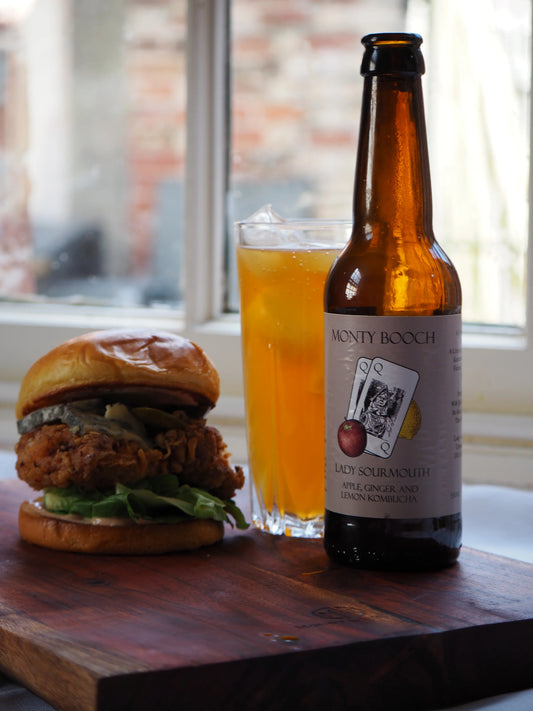
Is Kombucha Vegan? Is Kombucha Good For People on a Plant Based Diet?
Is Kombucha Vegan?
Yes, kombucha is generally considered vegan. It’s made by fermenting tea with a symbiotic culture of bacteria and yeast (SCOBY), which doesn’t involve animal products. The only outlier is that while vegan kombucha is generally the standard, some kombucha brands may use honey as a sweetener (a style known as Jun), which isn’t considered vegan. Additionally, while the bacteria and yeast in kombucha are living organisms, they are microbes, not animals, making them suitable for a vegan diet. There is however, always the possibility that a brand uses some form of animal product in the flavouring/refinement, but it isn't the standard. To be sure, always check the ingredients list or look for a certified vegan label on store-bought kombucha.
Why Kombucha is Perfect for a Plant-Based Diet
As more people embrace plant-based lifestyles, finding foods and beverages that align with their values while delivering nutritional benefits becomes a top priority. Enter Kombucha—a fermented, probiotic-rich drink that fits seamlessly into a plant-based or vegan diet. With its potential gut-friendly properties, all-natural ingredients, and rumoured health-boosting benefits, Kombucha is an ideal beverage choice for anyone committed to plant-based living. We explore why Kombucha is the perfect complement to a plant-based diet and how it supports a healthy, balanced lifestyle.
What is a Plant-Based Diet?
A plant-based diet emphasises consuming foods derived from plants, including fruits, vegetables, whole grains, nuts, seeds, and legumes. It can be entirely vegan or vegetarian, but the core principle is to minimise or eliminate animal products, focusing instead on nutrient-rich, whole foods.
People adopt plant-based diets for various reasons, including improving health, reducing their environmental impact, or adhering to ethical considerations related to animal welfare. Plant-based diets are typically rich in fibre, vitamins, and antioxidants, making them an excellent choice for supporting overall health and well-being.
Kombucha: A Natural Fit for a Plant-Based Lifestyle
Kombucha fits perfectly into a plant-based diet for several key reasons. Let’s take a closer look at why this probiotic beverage aligns with plant-based living:
1. Completely Plant-Based and Vegan-Friendly
At its core, Kombucha is made from three simple, plant-based ingredients: tea, sugar, and a SCOBY (Symbiotic Culture of Bacteria and Yeast). None of these components come from animal products, making Kombucha inherently vegan and suitable for any plant-based diet. While the fermentation process involves bacteria and yeast, these are natural microorganisms, not derived from animals.
Monty Booch uses natural flavourings, like fruit juices, herbs, and spices, which are also plant-based, so it’s easy to find Kombucha options that align with vegan and vegetarian lifestyles. For vegans who seek to avoid animal byproducts, Kombucha offers a safe, tasty alternative to other beverages that may contain hidden animal-derived ingredients (like gelatin in some drinks).
2. Kombucha is Rich in Probiotics for Optimal Gut Health
One of the key reasons Kombucha is popular among health-conscious individuals—including those following plant-based diets—is its high probiotic content. Probiotics are live bacteria and yeasts that are beneficial for your digestive system, helping to maintain a balanced gut microbiome. A healthy gut is crucial for anyone, but particularly for those on plant-based diets, as gut health plays a significant role in nutrient absorption and overall well-being.
Since plant-based diets are often high in fibre, introducing probiotic-rich foods like Kombucha can further support digestion, help prevent bloating, and improve the breakdown of plant-based nutrients. Kombucha’s naturally occurring probiotics, such as Lactobacillus and Bifidobacterium strains, contribute to a balanced digestive system, helping to keep your gut flora in tip-top shape.
3. Kombucha is Packed with Antioxidants
Plant-based diets are known for their high levels of antioxidants—compounds that help neutralize free radicals and reduce oxidative stress in the body. Kombucha, particularly when brewed with green or black tea, contains high levels of polyphenols, which are potent antioxidants.
Antioxidants from Kombucha work alongside those found in fruits, vegetables, and other plant-based foods to reduce inflammation, promote healthy ageing, and protect cells from damage. The more antioxidants you can incorporate into your diet, the better, and Kombucha provides an easy, enjoyable way to boost your intake.
4. Low in Sugar, Yet Naturally Sweet
For many people on plant-based or vegan diets, reducing sugar intake is a priority. Kombucha strikes a great balance as a low-sugar beverage that still satisfies your craving for something sweet and fizzy. During the fermentation process, the SCOBY feeds on the sugar, converting much of it into beneficial acids, probiotics, and a small amount of alcohol (usually less than 0.5%). This means that by the time the Kombucha is ready to drink, it contains only a fraction of the sugar it started with.
This makes Kombucha a healthier alternative to sugary sodas or energy drinks, while still offering a refreshing taste. Plant-based dieters who are mindful of their sugar consumption can enjoy Kombucha as a guilt-free beverage that provides flavour without the sugar spikes.
5. A Sustainable, Eco-Friendly Beverage Choice
Plant-based diets are often associated with sustainability, as they typically have a lower environmental impact than diets that include animal products. Kombucha fits into this sustainable mindset in a few important ways:
- Minimal Ingredients: Kombucha is made from tea, water, sugar, and a SCOBY, with few additional ingredients. The simplicity of its production reduces the need for resource-intensive inputs.
- Reusable SCOBY: The SCOBY used in Kombucha brewing can be reused for multiple batches, meaning that you don’t need new resources every time you brew a batch of Kombucha. This reduces waste and supports sustainable brewing practices.
- Glass Bottles: Many Kombucha brands sell their products in reusable or recyclable glass bottles, making them an eco-friendly alternative to single-use plastic beverages.
For plant-based consumers who are conscious of their environmental footprint, Kombucha offers a beverage choice that aligns with sustainable values.
6. Pairs Perfectly with Plant-Based Foods
Kombucha’s tangy, slightly acidic flavour makes it a versatile pairing with many plant-based dishes. It can complement a variety of vegan meals, from hearty grain bowls and fresh salads to rich curries and plant-based burgers. The natural acidity in Kombucha also helps to balance out richer plant-based meals, enhancing the flavours of foods like avocados, sweet potatoes, and legumes.
Additionally, Kombucha can be a refreshing drink to enjoy during or after a meal, as its probiotics aid digestion, helping you feel less bloated or sluggish after eating fibre-rich foods.
7. Kombucha for Plant-Based Fitness Enthusiasts
Many people who adopt plant-based diets do so for health reasons, including improving their fitness and energy levels. Kombucha can be a beneficial addition to a plant-based fitness regimen for a few reasons:
- Hydration and Recovery: Kombucha helps keep you hydrated during workouts, and the antioxidants can support muscle recovery.
- Energy Boost: Kombucha contains small amounts of naturally occurring B vitamins, which are known for boosting energy and supporting metabolism. These vitamins are crucial for plant-based eaters who may need an extra energy boost during their workouts.
Whether you’re fuelling up before a workout or looking for a post-exercise recovery drink, Kombucha can fit right into your plant-based fitness routine.
Conclusion: Kombucha Complements a Plant-Based Diet
Kombucha isn’t just another health trend—it’s a natural, probiotic-rich beverage that aligns with the values of plant-based eaters. Its gut-friendly properties, low sugar content, and antioxidant benefits make it an excellent choice for those looking to support their health while maintaining a plant-based or vegan lifestyle.
Whether you’re new to plant-based eating or a long-time advocate, Kombucha offers a delicious, refreshing, and sustainable beverage option that fits seamlessly into your diet. So next time you’re looking for a healthy drink to enjoy alongside your plant-based meals, reach for a bottle of Kombucha and savour the many benefits it has to offer!
Try pairing this plant-based recipe with our lady sour mouth Kombucha
Sweet Potato and Quinoa Salad with Maple Dijon Dressing
This vibrant Sweet Potato and Quinoa Salad pair perfectly with the refreshing, tangy flavours of ginger, lemon, and apple Kombucha. The roasted sweet potatoes provide a satisfying, earthy sweetness that balances the tartness of the Kombucha, while the quinoa offers a light, fluffy texture. Fresh greens, crunchy nuts, and a zesty maple Dijon dressing elevate this dish to a delicious, nutrient-packed meal.
Ingredients:
For the Salad:
- 2 medium sweet potatoes, peeled and diced
- 1 cup quinoa (uncooked)
- 2 cups baby spinach or arugula
- ¼ cup roasted pumpkin seeds or walnuts
- ¼ cup dried cranberries or raisins
- 2 tbsp olive oil
- Salt and pepper to taste
For the Maple Dijon Dressing:
- 2 tbsp olive oil
- 1 tbsp maple syrup
- 1 tbsp Dijon mustard
- 1 tbsp lemon juice
- 1 tsp grated ginger (for extra flavour to complement the Kombucha)
- Salt and pepper to taste
Instructions:
- Roast the Sweet Potatoes:
- Preheat your oven to 400°F (200°C).
- Toss the diced sweet potatoes with olive oil, salt, and pepper. Spread them on a baking sheet in a single layer.
- Roast for 25-30 minutes, turning halfway through, until the sweet potatoes are golden and tender.
- Cook the Quinoa:
- Rinse the quinoa under cold water to remove any bitterness.
- In a medium saucepan, combine 1 cup quinoa with 2 cups of water. Bring to a boil, then reduce the heat to low, cover, and simmer for 15 minutes or until the water is absorbed.
- Fluff the quinoa with a fork and set aside to cool slightly.
- Prepare the Dressing:
- In a small bowl, whisk together the olive oil, maple syrup, Dijon mustard, apple cider vinegar, grated ginger, salt, and pepper until well combined.
- Assemble the Salad:
- In a large bowl, combine the cooked quinoa, roasted sweet potatoes, baby spinach, pumpkin seeds or walnuts, and dried cranberries.
- Drizzle the maple Dijon dressing over the salad and toss everything together until well coated.
- Serve:
- Plate the salad and serve it with a chilled glass of Lady Sourmouth Kombucha. The crisp, tangy flavours of the Kombucha beautifully complement the warm, sweet notes of the salad.




